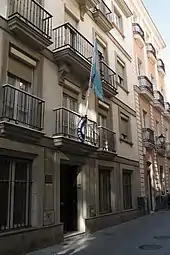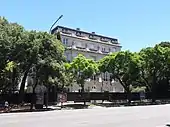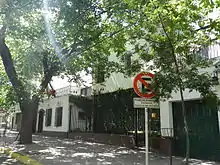Argentina–Spain relations
Argentina–Spain relations refers to the bilateral relationship between the Argentine Republic and the Kingdom of Spain. Both nations are members of the G-20, Organization of Ibero-American States and the United Nations.
 | |
Argentina |
Spain |
|---|---|
History
Spanish colonization

In 1516, the first Spanish expedition to visit what is now Argentina was led by the explorer Juan Díaz de Solís. In 1536, the first Spanish settlement was created in the Río de la Plata basin. Since then, Argentina was formally incorporated into the Viceroyalty of Peru governed from Lima under the Spanish crown. In 1776, the Viceroyalty of the Río de la Plata was created with the head of government placed in Buenos Aires.
Independence
In May 1810, the May Revolution where Argentina declared its independence from Spain. For the next eight years, Argentina, led by José de San Martín, fought Spanish troops for independence. In 1824, Argentina obtained its independence. In 1863, a Treaty of Peace and Amity was signed and thus established diplomatic relations between the two nations.[1]
Post independence
Since obtaining independence from Spain, diplomatic relations between the two nations have been stable. During the Spanish civil war, Argentina remained neutral and gave asylum to any Spanish citizen requesting it without regards to whether they were Republicans or Nationalists.[2] At the end of the war, Argentina maintained diplomatic relations with the government of General Francisco Franco. Maintaining diplomatic relations allowed for the first lady of Argentina Eva Perón to visit Spain in 1947 and donate five million tons of food to the Spanish people.[3]
After the death of General Franco in Spain in 1975, Argentina entered a period of military dictatorship between 1976 and 1983. In 1982, Argentina invaded the Falkland Islands. Spain recognised and supported the claims of Argentine territorial rights over the islands. In 2012, British documents were made declassified and stated that Prime Minister Margaret Thatcher feared that during the Falkland war, Spain would join Argentina by invading Gibraltar.[4]
A dispute arose in 2012, when Argentina sought to nationalize the energy company YPF, owned by the Spanish multinational company Repsol. Spain warned against such a move stating that it would harm bilateral relations if such a move were to happen.[5] On 16 April, Argentina's President Cristina Fernández de Kirchner announced the nationalization of YPF, to which Spain warned of a "clear and decisive" response.[6] The Argentine government paid a $5 billion settlement to the Spanish government and Repsol over YPF.[7]
In the 2010s an Argentine court accused Antonio González Pacheco, a former police inspector, of committing criminal acts during the Franco regime. He was sought for extradition by an Argentine judge in 2014.[8] María Romilda Servini had called for the indictment.[9] The request for extradition was refused by the Spanish High Court on the basis that the statute of limitations had run out on the accusation against him.[10]
Bilateral

Over the years, both nations have signed numerous bilateral agreements such as an Air Transportation Agreement (1947); Agreement on the Elimination of Visas (1947); Agreement on Migration (1960; Agreement on Cultural Cooperation (1971); Agreement on Scientific and Technical Cooperation (1972); Agreement on Economic Cooperation (1974); Extradition Treaty (1987); Agreement on the Promotion and Protection of Investments (1991); Agreement on mutual recognition of Drivers License (2002) and an Agreement on the Avoidance of Double-Taxation (2013).[1]
Transportation
There are direct flights between Argentina and Spain through the following airlines: Aerolíneas Argentinas, Air Europa, Iberia and Level.
Trade
In 2017, trade between Argentina and Spain totaled €2.7 billion Euros.[11] Argentina's main exports to Spain include: animal based products, frozen fish, crustaceans and sea mussels, copper and organic chemicals. Spain's exports to Argentina include: automobile components and equipment, electrical material and pharmachemicals.[11] Spanish multinational companies such Banco Bilbao Vizcaya Argentaria, Banco Santander, Mapfre, Telefónica and Zara operate in Argentina.
Resident diplomatic relations
- Argentina has an embassy in Madrid and consulates-general in Barcelona and Vigo and consulates in Cádiz, Palma and Santa Cruz de Tenerife.[12]
- Spain has an embassy in Buenos Aires and consulates-general in Bahía Blanca, Córdoba, Mendoza and Rosario.[13]
 Embassy of Argentina in Madrid
Embassy of Argentina in Madrid_building_(passeig_de_Gr%C3%A0cia)_06.JPG.webp) Consulate-General of Argentina in Barcelona
Consulate-General of Argentina in Barcelona Consulate of Argentina in Cádiz
Consulate of Argentina in Cádiz Embassy of Spain in Buenos Aires
Embassy of Spain in Buenos Aires Consulate-General of Spain in Buenos Aires
Consulate-General of Spain in Buenos Aires Consulate-General of Spain in Mendoza
Consulate-General of Spain in Mendoza
See also
References
- Spanish Ministry of Foreign Affairs on Argentina (in Spanish)
- La guerra civil española y la sociedad Argentina (in Spanish)
- "16 días con Evita Perón en España (in Spanish)". Archived from the original on 23 October 2013. Retrieved 17 June 2014.
- El País: ¿Puede España atacar Gibraltar? (in Spanish)
- Spain Cautions Argentina on Takeover of Energy Firm
- Spain Pledges Action Against Argentina Over YPF Seizure
- Spain's Repsol agrees to $5 billion settlement with Argentina over YPF
- Rafael, Patricia; Yardley, Jim (30 April 2014). "No Extradition for Franco-Era Police Inspector". The New York Times. Madrid: The New York Times Company. Retrieved 13 November 2017.
- "Argentina calls for extradition of Francoists over human rights abuses". The Guardian. 19 September 2013. Retrieved 11 August 2019.
- "Argentina asks Spain to arrest 20 Franco-era officials". BBC News. BBC. 1 November 2014. Retrieved 13 November 2017.
- Argentina-España: Relaciones Económicas y Oportunidades de Negocio (in Spanish)
- Embassy of Argentina in Spain
- Embassy of Spain in Argentina

.svg.png.webp)